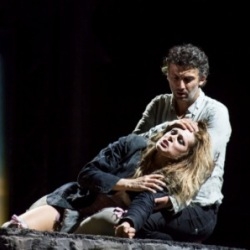Manon Lescaut (Royal Opera House)
Puccini’s break-through opera returns to Covent Garden after a thirty-year absence

© Bill Cooper
She’s no Mimì either. Incapable of starving for long in their Parisian garret (an episode that the future composer of La bohème ironically leaves unstaged), by the start of act two she’s off to glitter and be gay in the demi-monde. Jonathan Kent‘s modern-day staging for the Royal Opera sees her exploited by sugar-daddy Geronte (a splendidly seedy Maurizio Muraro) in a perspex boudoir of bling and bust-enhancers where, dolled up as a kind of Manon Nicole, she entertains moneyed old creeps via a live video stream.
The updating is entirely valid: it never betrays the plot and offers a startlingly pertinent reflection of today’s ‘me’ culture. Tune to any number of cable channels and they’re full of documentaries about young people with Manon’s values. Ironically, the production’s only dislocation is with the pit, for the simple reason that Antonio Pappano‘s fabulous conducting of Puccini’s score, impassioned and Mediterranean-fresh, sometimes feels at odds with the cynicism unfolding onstage. Kent may be in the 21st Century but the heady orchestral sweep is firmly rooted in the 19th.
"Kaufmann can sing anything, it seems"
Two glamorous and talented stars are the big draw to this production and they didn’t disappoint. Kristīne Opolais was in wonderful voice as Manon, even of tone and richly coloured, while as an actress of great power she traced a painful descent from sweet ingénue through kept woman to trafficked prostitute before finding redemption in death, filled with regret for what might have been – "Oblivion will wash away my faults but my love will never die".
Jonas Kaufmann can sing anything, it seems. The great German tenor was in magnificent voice, somehow managing to sound heroic and vulnerable at the same time, and looked every inch the young blade whose impulsive fling turns into something deeper. His Des Grieux broke the heart, a man so wretchedly beset by love and so desperate to rescue his beloved from her demons.
Christopher Maltman, singing every bit as exquisitely as his colleagues, explained Lescaut’s capricious behaviour by fizzing with energy of a kind that superficial people tend to hide behind. From a raft of well-taken supporting roles Benjamin Hulett was especially convincing as Des Grieux’ student friend student Edmondo and Luis Gomes a keenly evocative Lamplighter.
It’s possible to quarrel with the sheer scale of the sets by Paul Brown that include an apartment block, a red-light district and an elevated freeway, for Manon Lescaut is an intimate opera and the production should draw us in, not dazzle us with architectural massiveness. It calls for considerable star wattage to illuminate such a space but Opolais and Kaufmann take it in their stride.












